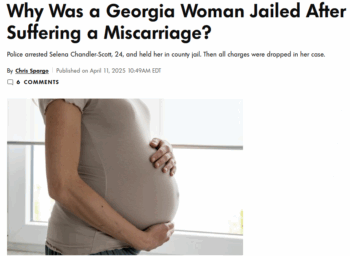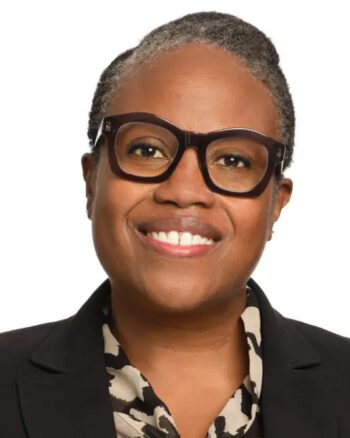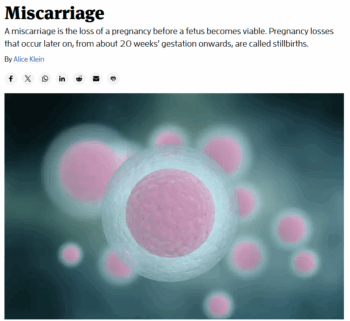Janine Jackson interviewed Pregnancy Justice’s Karen Thompson about criminalizing pregnancy for the April 25, 2025, episode of CounterSpin. This is a lightly edited transcript.

People (4/11/25)
Janine Jackson: “Why Was a Georgia Woman Jailed After Suffering a Miscarriage?” That’s the headline over an account of Selena Chandler-Scott, a 24-year-old woman who was treated by paramedics after a miscarriage on March 20 and arrested the 21st, charged with “concealing the death of another person” and “abandonment of a dead body.” Charges weren’t dropped until April 4.
And the question of the headline remains, to which I’ll add another: Why was this story in People Magazine and not, say, the New York Times?
Joining us now to talk about where this terrible story fits in the current landscape is Karen Thompson, legal director at the group Pregnancy Justice. She joins us now by phone. Welcome to CounterSpin, Karen Thompson.
Karen Thompson: Hi, thanks for having me.
JJ: There’s a single sentence in this People story that gave me chills: “Police investigated Chandler-Scott because she was 19 weeks into her pregnancy when she suffered her miscarriage.” That “because,” you know. But the DA says law enforcement “acted in good faith” by arresting her. Why is that? Why did she go to jail?
KT: She went to jail because of an idea that fetuses have legal rights. She had a miscarriage at home. She did what most doctors tell folks who are experiencing a miscarriage to do, which is to stay at home. But because she did that, and because someone saw her disposing of those remains, the EMTs and the prosecutors decided that she was engaging in a crime. And why? Because that fetal anomaly, the fact that she had that miscarriage, was enough for them to justify arresting her. And that’s the basis of pregnancy criminalization, and what we’re seeing, not only in Georgia, but all around the country.
JJ: So to be clear, this is not an aberration. It’s one of a number of cases. Listeners may have heard some of them, but I think for some people, they’re getting caught up in this “fetal remains” and the “disposal process.” But this is part of miscarrying. In other words, what are the laws that are relevant here?
KT: I think that’s a really important place to start, right? First of all, let’s just think and talk about miscarriages. They are pretty common. I believe the number is three out of five pregnancies might end in a miscarriage, and that goes to show that this isn’t something that’s abnormal. It’s not something that is unknown to individuals who are pregnant. It’s a tragedy, but it’s a tragedy that occurs quite frequently.
And so I think the saddest thing about this is that in this moment of loss, when she should have been given healthcare, and when she should have had a moment to grieve, she was instead facing a law enforcement response, a carceral response, to what is really a medical question and a health issue.
JJ: What are the laws? There are laws governing, and I guess they differ state to state, but what are important laws around—what on earth is a person to do when they miscarry at home with fetal remains?
KT: Well, it’s unfortunate, because Georgia did pass a fetal personhood law in 2019, and it has that law in its criminal code. And so what that means is that we’re still trying to figure out what prosecutions are going to be brought under that law. And even though Georgia has a specific infanticide law, that is any kind of homicide involving children, even though they have a law that exempts the conduct of a pregnant woman with respect to her unborn child, Georgia’s murder statute doesn’t have that same exception.
And so although courts before the passage of that fetal personhood law declined to recognize fetuses as people for the purposes of murder, we don’t know where we are right now. And the fact that this poor woman was charged in this way is showing us that the laws that are on the books are now being expanded, and used in this method to criminalize pregnant women.
JJ: I think they’re making use of the sort of secrecy and shame with which miscarriage can be surrounded. The very fact that people might not understand what happens when you miscarry at home has to do with silences around it.
And I want to point out the fact that Pregnancy Justice has a resource called Unpacking Fetal Personhood that really talks you through these laws—where they come from, what they do and what they mean. And I would direct folks to that resource.
As we record on April 24, I did do another search this morning. I still saw nothing from broadcast news, major dailies. And now it’s been a month in the past, so is it even “news’ anymore? I don’t know if these major outlets think that they have met their quota of reporting on efforts to control pregnant people, but what do you make of media attention in general to these laws, to their predicted and predictable impacts? How do you think journalists are doing on this?
KT: I don’t think they’re doing great, to be honest, for the reasons that you said. I think that there are a lot of ways in which the attention is pulled to what is being framed as a crime. But what is not happening is the understanding that even this terrific news, which did get reported on, that the charges were dropped against Ms. Chandler-Scott, the bigger problem is that it doesn’t undo the very real harm and devastation that the charges bring in the first place.
And what the media are doing by not reporting on the charges being brought, instead of the fact that they were dropped after pressure was brought to bear by the community, by the outrage of huge swaths of the United States population, that is the stuff that gets things going. But, unfortunately, it is the stuff that is always ignored by the media.
And that’s not just within the reproductive justice space. We’ve seen it when it comes to racial equity, economic equity. There are places that fall out of the conversation because the issues that they foreground, the issues that they shine light on, are really hard for people to accept.
And so my hope is that even in this really calamitous situation, Ms. Chandler-Scott is getting rest and privacy, but what it’s showing us is that we have to continue to talk about these cases. We have to continue to talk about what’s happening, and we have to hold space for women who are going through something that a lot of other women have experienced. We need to make sure that they are not feeling shame, that they know that they did not do anything wrong, and they deserve to get the medical help and the support that they need.
JJ: I was struck by a number of stories, of what stories there were, they would end with, “We reached out to Ms. Chandler-Scott, and we haven’t heard back.” And I thought, “You think? You think maybe she doesn’t want to chat right now?” And what I wonder is, why not reach out to the police? Why not reach out to the DA and ask them why they did what they did, and demand answers from them, rather than trying to add human interest or color to the story by talking to someone who doesn’t have any reason to necessarily talk to you?
KT: Right.
JJ: Well, that’s my rant.
And I’m just going to ask you, finally: Pregnancy Justice. It’s not just abortion rights; that’s part of it. Pregnancy justice is a more expansive term and concept, that’s not about separating out cases from one another. I’d just like to give you an opportunity, finally, to talk about what that broader understanding means. And then, are there particular policies and laws that you point to, that could meaningfully intervene right now? Just final thoughts.

Karen Thompson: “The thing that is important to know about pregnancy criminalization is that it doesn’t stay still.”
KT: Pregnancy Justice, our entire mission is to advocate for those who are being criminalized because of their pregnancies, their pregnancy outcomes, like a miscarriage in this case, or stillbirth or abortion. But, as you noted, abortion cases are actually a tiny fraction of what we see, and, sadly, the vast majority of them involve people who are criminalized for behavior during their pregnancy that people don’t approve of, whether that’s substance use, or maybe not even getting prenatal care in a way that others would like folks to do.
And so the thing that is important to know about pregnancy criminalization is that it doesn’t stay still. The laws that are being used to criminalize folks, as they were used here in the Chandler-Scott case, they’re not made, actually, to protect a child, but they’re being used against pregnant people in a way that is just harmful to pregnant people, and not actually helping or serving their pregnancies, or the fetus that the state is saying that they have interest to protect.
So our work is to make sure that the truth about science, and the reality of giving rights and not stripping them from pregnant people, upholding bodily autonomy for folks who are experiencing pregnancy—all of those things are our focus, so that we can make sure that the law is doing what it’s supposed to do, and not spreading to just criminalize pregnant people, and socially control how they act and the decisions they make with their bodies.
And, unfortunately, we’re up against a lot of laws, a lot of legislative pushes to make abortion a homicide, to say that any exposure in utero that might involve drugs, whether prescribed or not, is sufficient to charge somebody with murder if they have an adverse pregnancy outcome. All of these laws are percolating in at least 17 different states in the country.
So my hope is that people will stay aware, that they will look at the resources, including the one that you just mentioned, on our website, and that we can start thinking about the ways in which what is happening now reflects a broader picture of trying to keep women out of public space, from having power over their own bodies to make their own decisions, and to understand where that fits into a bigger picture around criminal justice and incarceration in this country.
JJ: All right then. We’ve been speaking with Karen Thompson, legal director at Pregnancy Justice. They’re online at PregnancyJusticeUS.org. Thank you so much, Karen Thompson, for joining us this week on CounterSpin.
KT: Thanks so much for having me, and having this discussion.
This content originally appeared on FAIR and was authored by Janine Jackson.
